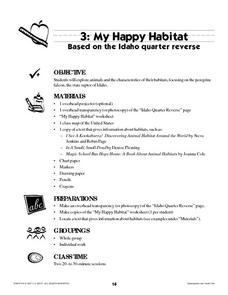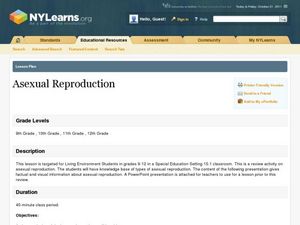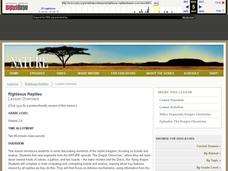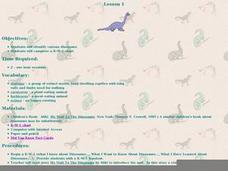Curated OER
Winter
Learners examine how animals adapt to the harsh New England winter. They discuss articles they have read on the subject.
Curated OER
Invasive Species
Learners study exotic and native species, and examine how exotic species can impact native ones. They study how the mute swan effects native species.
Curated OER
The Seasonal Cycle
Students complete a unit of lessons on the four seasons. They examine the effect each season has on plants, animals, and people during the actual season, read magazine and newspaper articles, and create a calendar and poster about each...
Curated OER
Life Cycles
Using computers, Students work in small groups and progress through the roles of Explorer, Researcher, Designer, and Evaluator as they study the life cycle of plants, insects, butterflies and frogs.
Curated OER
Understanding Life System: Growth and Changes in Plants
Third graders research ways in which plants are essential to humans. In this Global Peace instructional activity, 3rd graders participate in tasks, such as creating a propaganda poster. Students may watch the film, The Lorax, as a...
Curated OER
Everything in Its Place: Science Classification
Students investigate the system of classification for living things through the sixteen lessons of this unit. The five kingdoms of monerans, protists, fungi, plants, and animals form the basis of several experiments as the similarities...
Curated OER
My Happy Habitat
Students observe and discuss the Idaho state quarter to begin an activity in which they define and draw different types of habitats. They discuss the habitats that the migrating Peregrine falcon, which appears on the Idaho quarter,...
Curated OER
Life Science Review for Grade 4
In this life science review for grade 4 worksheet, 4th graders answer 25 multiple choice questions in standardized test format about life science.
Curated OER
Natural Figures
First graders look for geometrical shapes in nature to help them appreciate the diversity of the natural environment.
Curated OER
Asexual Reproduction
Sixth graders investigate how asexual reproduction produces single-parent offspring. They use plants and yeast to demonstrate vegetative propagation and budding in a laboratory. Students draw five different types of asexual reproduction.
PBS
Righteous Reptiles
Young scientists write and draw about their knowledge of reptiles. They also view a nature video focusing on lizards and snakes, complete a chart comparing and contrasting them. Next, they focus on the defense mechanisms that they...
Curated OER
Identifying Dinosaurs
Students investigate basic information about dinosaurs. They listen to the book, "My Visit To the Dinosaurs," explore various websites, take an online quiz, and play an online dinosaur game.
Curated OER
A Natural Habitat: What, How and Why
Students understand what a habitat is. They determine why a habitat is important to our environment no matter where it is located. Students observe and recognize natural habitats in their surroundings.
Curated OER
Plants and Animals of Great Bay Animals and Plants of the Estuary
Students participate in a webquest about the plants and animals that inhabit an estuary. They role play as environmentalists researching this habitat and present the results of their research in a creative way.
Curated OER
Food Web Follies
Seventh graders cut and paste animal pictures to create a food web and trace the path of energy. They write a paragraph explaining the importance of photosynthesis in all food webs.
Curated OER
Critter Museum
Students act as directors of a new science museum where they have decided to set up a display of animals without backbones that are found in the area. To organize their display, they need to sort and classify a collection of animals and...
Curated OER
Lake and Pond Study
Students examine the habitat and community structure of a pond that could support Ospreys through games and worksheets. They then go on a field trip to a pond to evaluate the suitability of the pond as an Osprey habitat.
Curated OER
Our Special Planet Earth
Students explore what is special about our planet. They explore the various climates that are found on the planet Earth. Students create an advertisement to convince people why their favorite environment would be the best place to visit.
Curated OER
Bird Beak Adaptation Lab
Students investigate bird beaks to determine which physical adaptations are necessary based on the types of food the birds eat. They participate in a lab by visiting multiple stations to determine which beaks are most efficient, and...
Curated OER
Patterns and Adaptations in Plants and Animals
Fourth graders conduct research about some of the regions of Texas. They compare plants and animals to identify different adaptations. The statistics of survival rates are measured for changes.
Curated OER
California Biodiversity
Students examine several maps of California exhibiting features such as precipitation, topography, and vegetation. They look for patterns that might be the source of or influence biodiversity in different regions. They pay particular...
Curated OER
Animals
First graders study the basic needs of animals and compare them to human needs. They make bird feeders using milk carton and pine cones. They review the basic needs of food, water, air, and shelter and discuss what happens when animals...
Curated OER
What Does Life Look Like Under a Microscope?
Students discover cells make up all living things. In this life science lesson plan, students investigate living organisms and the cells that create them. Finally the students create a testable question, conduct an investigation, and...
Curated OER
Rocks and Minerals: Sedimentary Rocks
Students explore the concept of rock formation. For this sedimentary rocks lesson, students observe and record their findings about sedimentary rocks. Students then create limestone, coal, and sandstone models and write reports...

























